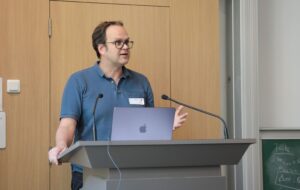AI and precision medicine: revolutionizing care through digital innovation


Precision medicine, which aims to tailor treatments to individual patient characteristics, is booming thanks to advances in AI. Thomas Walter and his team at CBIO are working on methods for analyzing massive data to predict biological behavior at an unprecedented level of precision. These innovations, applied to biology, molecules and genomes, open up new avenues for understanding diseases and designing more targeted and effective treatments.
One of the major challenges of precision medicine lies in the analysis of complex genetic data. Some approaches require the development of appropriate statistical methods, as the number of genetic variables far exceeds the number of patients, making analysis extremely complex. This is the case, for example, with Genome Wide Association Studies (GWAS), a method designed to predict patient-related characteristics, such as the risk of cancer relapse or response to treatment, on the basis of genetic variants (SNPs). Progress in this field will enable us to better understand the links between genetics and disease, and to personalize treatments according to each patient’s genetic profile.
Another major application of AI in precision medicine lies in chemistry and structural biology. CBIO is developing methods for analyzing the properties of proteins and molecules to predict their interactions and design new drugs. Chemogenomics, in particular, makes it possible to identify interactions between proteins and molecules, thus facilitating the discovery of more effective and specific treatments for various pathologies.

Thomas Walter at the Santé Numérique seminar.
Early diagnosis of cancer is a major issue, particularly for lung cancer, which is often diagnosed at an advanced stage, reducing patients’ chances of survival. Using nasal smear samples, a method similar to COVID testing, and machine learning techniques, CBIO has developed a predictive model to identify people at high risk of developing lung cancer. This project aims to facilitate faster, earlier diagnosis, an essential approach to improving patient survival rates.
In the field of anatomopathology, where images of tumor sections are analyzed to obtain information about the disease, AI enables the development of even more sophisticated predictive models. The CBIO has worked on applications of this technology to predict response to treatment, risk of relapse or even genetic signatures, notably in the fight against cervical and laryngeal cancers. These advances, based on high-resolution images, offer a better understanding of cancer progression and pave the way for more appropriate treatments.
In addition to its applied research work, CBIO plans to reconcile mechanistic and statistical models to further enhance the effectiveness of precision medicine. Analyzing patient pathways through the massive data generated in hospitals is another promising avenue for the application of AI, enabling a better understanding of disease progression and prediction of treatment responses.
The CBIO team is also involved in cutting-edge projects such as spatial transcriptomics, a revolutionary technology that can distinguish subtle differences between patients responding positively or negatively to a treatment. These advances make it possible to better personalize care and optimize treatments for each individual patient.
CBIO is involved in national and international projects. The laboratory is actively involved in the PRAIRIE initiative, an institute of excellence in AI that fosters high-level collaborations, and in projects such as Cell-ID, which aims to understand the cellular trajectories behind pathologies, notably pediatric cancers. The CBIO is also involved in multidisciplinary research projects within the Institut des Cancers de la Femme, aimed at improving care for women with gynecological or breast cancers.
Created in March 2024, the Mines Paris – PSL ITN is positioned as a central player in the digital transition, mobilizing the expertise of its 18 research centers. With strategic focus areas such as digital health, digital engineering and cultural industries, the ITN federates knowledge to meet the economic, social and technological challenges of our time. Driven by a responsible and collaborative approach, it aims to accelerate innovation and guide public and private players in this transformation.
The Santé Numérique seminar brought together researchers, industrialists and decision-makers to discuss the major challenges of digitizing healthcare. In a world where technological advances are redefining medical practices, digital health is emerging as a lever for meeting the current and future challenges facing the healthcare system. ITN explores these transformations through various themes: the reinvention of hospital infrastructures, the development of digital twins for precision medicine, and the integration of artificial intelligence at all levels of healthcare. These issues are not limited to technological innovation, but also question the social, economic and ethical dimensions of connected, intelligent medicine, paving the way for more personalized, accessible and predictive care.